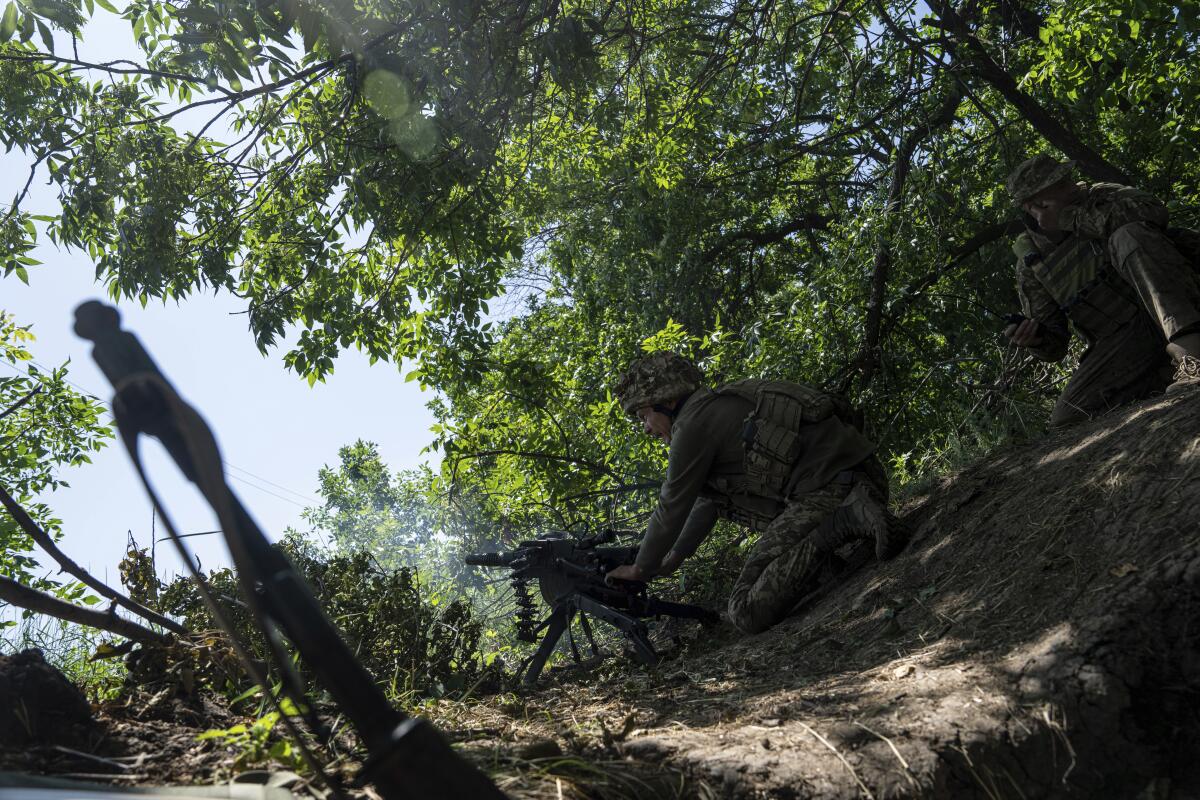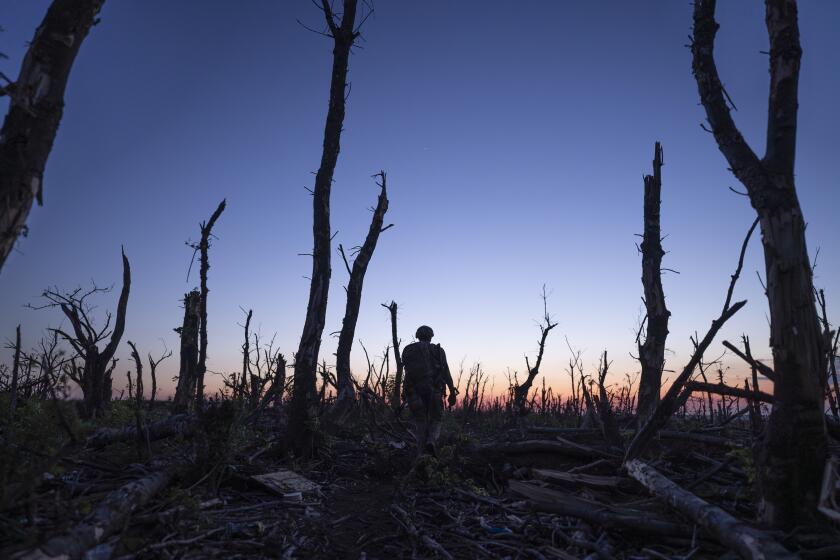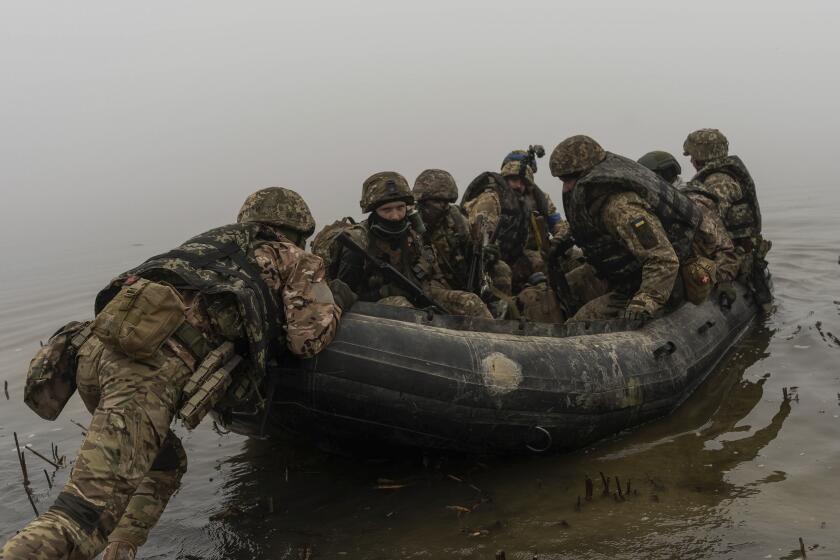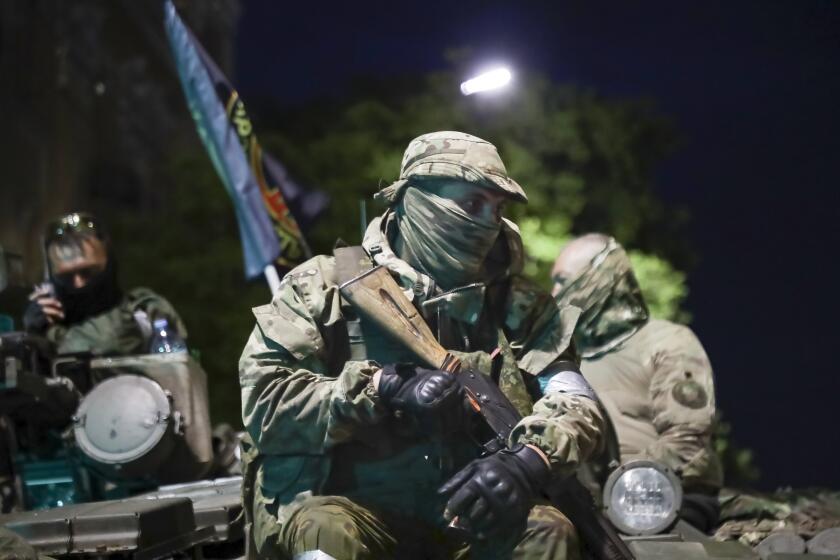Ukrainian forces don’t have enough artillery to battle Russia, as a key withdrawal shows

- Share via
KYIV, Ukraine — Delays in weapons deliveries from Western allies to Ukraine are opening a door for Russian battlefield advances, Ukrainian President Volodymyr Zelensky says, making the fight “very difficult” along parts of the front line where the Kremlin’s forces captured a strategic city last weekend.
Zelensky and other officials have often expressed frustration at the slow pace of promised aid deliveries, especially since signs of fatigue have emerged two years into the war. European countries are struggling to find enough stocks to send to Kyiv, and U.S. aid worth $60 billion has stalled over political differences. That appears to be playing into the hands of Russian President Vladimir Putin.
Even so, more help is headed to Ukraine, as Sweden announced Tuesday its biggest aid package so far and Canada said it was expediting the delivery of more than 800 drones.
Zelensky, in his daily video address Monday, said Russia has built up troops at points along the 930-mile front line, apparently aiming to pounce on perceived defensive weaknesses.
“They are taking advantage of delays in aid to Ukraine,” he said after visiting the command post in the area of Kupiansk in the northeastern Kharkiv region.
The year started with high hopes for Ukrainian troops planning a counteroffensive against Russia but ends with anxiety over aid from allies.
He said Ukrainian troops are keenly feeling the shortage of artillery, air defense systems and long-range weapons.
Ukrainian forces withdrew over the weekend from the strategic eastern city of Avdiivka, where they had battled a Russian assault for four months despite being heavily outnumbered and outgunned.
Putin on Tuesday congratulated his defense minister, Sergei Shoigu, on capturing Avdiivka and urged him to press Russia’s advantage. Shoigu said the military had launched up to 460 strikes on the city per day, equivalent to about 200 metric tons of explosives.
“We got the enemy in such a state that it was forced to flee the unbearable conditions,” he said.
But Oleksiy Danilov, head of Ukraine’s National Security and Defense Council, said that while the lack of ammunition is a problem, the situation on the eastern front is not catastrophic.
“We fight and will continue to fight,” he told news outlet Ukrainska Pravda. “We have only one request to our partners: to help with weapons, with ammunition and with air defense.”
He claimed that Russia racked up heavy losses of troops and equipment in the fight for Avdiivka. His claim could not be independently verified.
Ukraine President Volodymyr Zelensky says he spoke by phone with President Biden about Washington’s future support for Kyiv, which remains uncertain.
Analysts are expecting a lull in Russian attacks in the Avdiivka area. The Kremlin’s forces will require time to “rest and refit,” the U.K. Ministry of Defense said in an assessment Tuesday. The Institute for the Study of War, a Washington think tank, also predicted an “operational pause” by Russia in the area.
Zelensky said talks with foreign partners are focusing on how to “resume and extend” support.
Sweden, which is poised to join NATO, said Tuesday it will donate military aid to Ukraine worth $681 million. That includes 30 boats, some of which are powerful military assault craft, and underwater weapons. The deal also includes artillery ammunition, Leopard tanks, shoulder-borne anti-aircraft defense systems, anti-tank missiles, grenade launchers, hand grenades and medical transport vehicles.
“By supporting Ukraine, we are also investing in our own security,” Defense Minister Pål Jonson told a news conference in Stockholm. “If Russia were to win this terrible war, we would have significantly greater security problems than we have today.”
The Canadian government said Monday it will dispatch more than 800 drones to Ukraine starting as early as the spring. They are part of a previously announced military aid package worth $370 million.
Ukraine last year received $42.5 billion from foreign partners, of which $11.6 billion was in nonrepayable grant aid, the country’s Ministry of Finance said Tuesday.
With the shocking mutiny by Russia’s Wagner mercenaries put down for now, Moscow and Kyiv both work to calculate where their war goes from here.
The grant assistance was provided by the U.S., Japan, Norway, Germany, Spain, Finland, Switzerland, Ireland, Belgium and Iceland, it said. The U.S. provided the largest share, $11 billion.
Long-term concessional financing amounted to $30.9 billion, which included loans from the European Union ($19.5 billion), the International Monetary Fund ($4.5 billion), Japan ($3.4 billion), Canada ($1.8 billion), the U.K. ($1 billion), the World Bank ($660 million) and Spain ($50 million).
Meanwhile, a Russian Lancet drone struck a house in Ukraine’s northern Sumy region Tuesday, killing five members of one family, the regional administration said. A woman, her two sons and two visiting relatives died as a result of the strike in Nova Sloboda, a village bordering Russia.
Ukraine shot down all 23 Shahed drones that Russia launched Monday night over various regions of the country, the air force said.
Air force spokesman Yurii Ihnat said Russian aircraft activity had dropped after Ukraine recently shot down a number of enemy warplanes.
The air force commander, Mykola Oleschuk, said Monday that his troops destroyed Su-34 and Su-35 bomber jets. Over the weekend, he said other Russian jets had been shot down.
Associated Press writers Jan M. Olsen in Copenhagen, David Keyton in Stockholm and Barry Hatton in Lisbon contributed to this report.
More to Read
Sign up for Essential California
The most important California stories and recommendations in your inbox every morning.
You may occasionally receive promotional content from the Los Angeles Times.
















